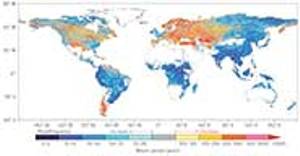Jun 10 2013
Flood risk is projected to increase in humid areas in Asia and Africa and decrease in most regions of Europe except the UK and northern France by the end of this century, according to a new model published today in Nature Climate Change.
 Projected change in flood frequency. Return period (years) in 21C for river discharge corresponding to the 20C 100-year flood is shown. Image by Professor Yukiko Hirabayashi, University of Tokyo
Projected change in flood frequency. Return period (years) in 21C for river discharge corresponding to the 20C 100-year flood is shown. Image by Professor Yukiko Hirabayashi, University of Tokyo
An international team of researchers, including Dr Dai Yamazaki from the University of Bristol, estimated the change in global flood risk in the 21st century with a state-of-the-art global hydrodynamics model that used the outputs from 11 global climate models under the latest climate change scenarios.
Dr Dai Yamazaki said: "So far, only a few studies have projected changes in floods on a global scale and none of these studies relied on multiple climate models. As the consistency of flood risk change among the 11 global climate models was found to be low in some regions, multi-model analysis for future flood risk assessment was needed."
In this study, the researchers used a global river routing model with an inundation scheme to compute river discharge and inundation area. Their projections demonstrated a large increase in flood frequency in Southeast Asia, peninsular India, eastern Africa and the northern half of the Andes, with small uncertainty in the direction of change. In certain areas of the world, however, flood frequency was projected to decrease.
Dr Dai Yamazaki said: "We estimated the change in population exposed to flood by overlaying simulated flooded area onto global population data. Flood exposed population was projected to be increased significantly following global temperature rise. We also found a large inter-annual variability in flood risk. Adaptations to flood risk change should therefore be made before the increase trend in flood risk becomes significant."
Paper
'Global flood risk under climate change' by Yukiko Hirabayashi, Roobavannan Mahendran, Sujan Koirala, Lisako Konoshima, Dai Yamazaki, Satoshi Watanabe, Hyungjun Kim and Shinjiro Kanae in Nature Climate Change
Cabot Institute
The Cabot Institute at the University of Bristol carries out fundamental and responsive research on risks and uncertainties in a changing environment. Its interests include natural hazards, food and energy security, resilience and governance, and human impacts on the environment. Its research fuses rigorous statistical and numerical modelling with a deep understanding of interconnected social, environmental and engineered systems – past, present and future. It seeks to engage wider society – listening to, exploring with, and challenging our stakeholders to develop a shared response to twenty-first century challenges.
Source: http://www.bristol.ac.uk/